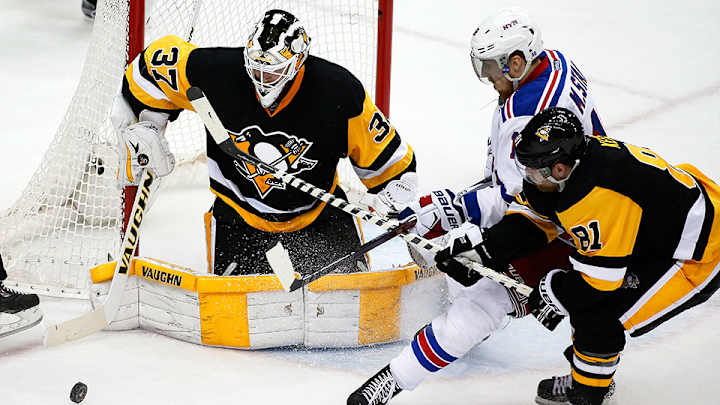Zatkoff, Hornqvist key Penguins to Game 1 win over Rangers

Get all of Jeremy Fuchs’s columns as soon as they’re published. Download the new Sports Illustrated app (iOS or Android) and personalize your experience by following your favorite teams and SI writers.
In a game filled with backup goaltenders, shorthanded goals and a stick to the eye, the Pittsburgh Penguins took the opener of their Metropolitan Division showdown with the New York Rangers, 5–2 (box score | recap | highlights).
Making his first career playoff start, Pittsburgh's Jeff Zatkoff stopped 36 shots in an impressive playoff debut and got some help from Patric Hornqvist, who notched a hat trick. Derek Stepan scored both of the Rangers' goals.
While the Penguins took an early lead in the series thanks to a big third period, the major story is the potential loss of New York netminder Henrik Lundqvist, who left the game after taking a stick to the eye in the first period. Here are three thoughts on the evening:
The Battle of the Backups
Rangers’ Lundqvist leaves game after taking stick to the eye
A goalie matchup of Zatkoff and Antti Raanta doesn’t have the same cachet as a Fleury vs. Henrik Lundqvist duel, but it turned out to be a good battle. With Fleury out due to a concussion, and Lundqvist leaving the game after the first period, the second-stringers gave it their all.
Zatkoff, in particular, was fantastic, stopping 35 shots, most of them on Grade-A chances. The Rangers peppered him from all angles throughout the game, and he was up to the task and did an especially good job controlling rebounds. He was helped by the Rangers playing from the perimeter, with his Penguins teammates getting in the way of shots. The Pens will turn to Fleury once he’s fully healthy (he says he's symptom-free but has to be cleared to play), but if he’s out for an extended period of time, they can feel comfortable with the 28-year-old out there each night.
On the other end of the ice, Raanta stopped 16 of 19 through two periods, but the concern lies with the Lundqvist injury. On the game broadcast, Rangers coach Alain Vigneault said Lundqvist was “day-to-day” but given the terse, vague nature of NHL injury talk, we’ll take that with a grain of salt. The 26-year-old Raanta played well despite his .842 Sv%—good luck to any NHL goalie with Sidney Cosby on a breakaway—and was mostly helpless on the other two he let in. He’s a capable NHL backup, but it is still quite a drop-off from the All-World goaltending of Lundqvist.
Penguins' game hinged on special teams
Watch: Penguins’ Crosby scores on breakaway in Game 1
Here’s where the game turned.
The Rangers, after scoring on a 5-on-3 in the thirdperiod and still on an extended four-minute power play, had a chance to tie the game at two. Controlling the play for most of the opening minutes of the period, the puck squibbed near defenseman Dan Boyle, who had a wide-open net in front of him. But Pens defenseman Ben Lovejoy got to the puck first, sending it up the ice for a two-on-one that rookie winger Tom Kuhnhackl finished for the shortie. Pittsburgh had the league's fifth-best penalty kill during the regular season, along with the second-most shorthanded goals, and their special teams are already paying off in the postseason. The goal put New York on its heels, and paved the way for two more Penguins tallies.
Inside-out game the key to success
2016 NHL playoffs: Rangers vs. Penguins series preview
Four of the Penguins’ goals came from below the hash marks, right in front of the net (Hornqvist capped his hat trick with New York's cage empty). That’s where Pittsburgh spent most of the game. The Rangers, on the other hand, lived outside the offensive zone circles, with only a few inside chances, and two of those were the pair of third-period goals that Stepan scored.
Especially in a battle of backups, getting traffic in front is crucial. Zatkoff thrived, in part, because many of the shots the Rangers were taking were never right in front of the net. No point blank chances. Meanwhile, the first three Pittsburgh goals came from directly in front; the fourth came from a scrum and a rebound.
The Rangers did a nice job of controlling the puck, but they did not have a meaningful scrum in front of the net with multiple chances all game. Possession means nothing if the puck rarely makes it through the defense, especially against a team like Pittsburgh that does an especially good job of converting turnovers into offense.
